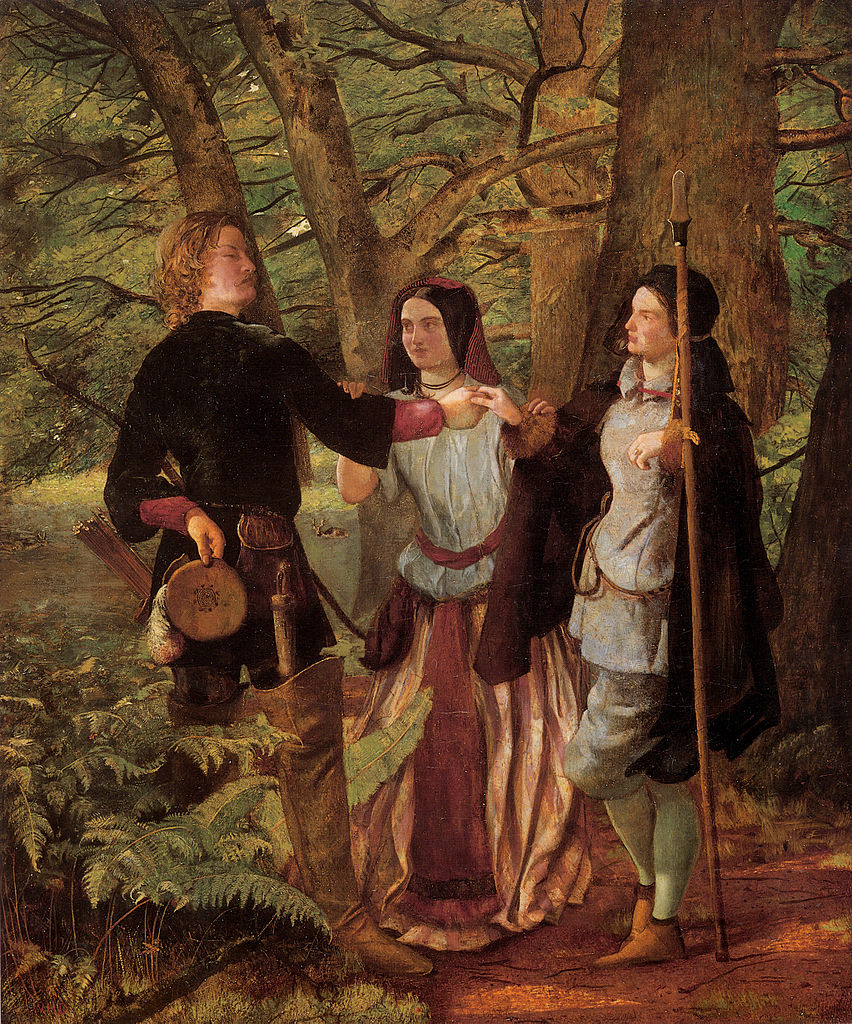“The arts are not an elective!” With this single proclamation, Carol Reynolds strengthened the classical education movement. Her expanded pronouncement is this, “Our Western cultural heritage is not an elective. It’s a treasure!” (Professor Carol speaks with infectious passion.)
As I drink my morning tea which happens to be in a Professor Carol mug depicting the above proclamation, I reflect: Professor Carol has influenced my life and the lives of countless others, by giving all of us permission to share the arts wholeheartedly with our children.

This Sunday afternoon my children and I attended the Shakespeare play As You Like It in a small venue that has become one of our favorites. You may know my children from Simply Classical: A Beautiful Education for Any Child. Michael and Michelle are adopted twins. Both have autism and schizophrenia. Small venues suit us well.
Because of a classical Christian education, both children appreciate the arts. Sometimes this is with clarification. “I don’t enjoy reading Shakespeare,” my son confessed as we drove to the theater, “but I do enjoy seeing the plays performed.” “That is perfectly normal,” I assured him. Shakespeare’s plays were meant to be performed.” Sitting back in his seat, he relaxed.
Michelle chimed in. She relishes reading and seeing the plays. “I remember when we acted out As You Like It in our homeschool. I was Rosalind. You were Cecelia, Mom. We all had parts,” she recalled with a delighted wriggle. She believes that Shakespeare’s plays are already fully alive in the written form and treasures the words, the poetry, the characters. The plays only become more wondrous when performed.
My delight is seeing both children appreciate the theater. Michael, the more analytical twin, catches many of the underlying themes. Michelle, the more alert and spontaneous twin, catches every joke with a sometimes loud and involuntarily chortle. (If we sit near the front, this is sometimes reflected by an equally involuntary smile from the actors.)
Those of us who appreciate classical education often call it transformative. So it seems with excellence in the theater. With great musings, characters, and storytelling, live performances imbued with truth, goodness, and beauty seem to leave us renewed, informed, and remarkably refreshed to face the trials in our own lives. This is not the same as the truly transformative power of the Holy Scripture, but as human beings we seem to be made more alive and more aware, civilly speaking, through the culture of the arts.
We need not begin with Shakespeare. In “Starting Small: Theater” (as with “Starting Small: Opera” and “Starting Small: Ballet”) we consider the many ways of introducing ourselves and our children to the wonders of the arts.
Live performances for children abound. Consider the original versions of Mary Poppins, The Sound of Music, or Cinderella. Older children may appreciate Fiddler on the Roof, The Music Man, or The Miracle Worker by William Gibson. Teens and young adults can read Shakespeare’s plays ahead of seeing them, such as with Midsummer Night’s Dream, Twelfth Night, Romeo & Juliet, The Merchant of Venice, and Hamlet.
Plays may be inexpensively performed at local high schools, community colleges, and community theater groups. For a special treat, consider obtaining tickets to exquisitely performed theater at the highest level you can afford. Then bask in the wondrous luxury. Over the years my daughter and I have splurged twice in this way, first for The Miracle Worker and later for Jane Austen’s Sense and Sensibility, with unparalleled memories.
If you lead a family, homeschool, cottage school, co-op, or classroom, you can introduce children to theater first-hand by giving them parts! This can begin before reading abilities are advanced. You might accomplish this with the dialog in any story, such as from Little Bear, Frog and Toad, or Blueberries for Sal. As reading abilities improve, assign parts from the animals in Aesop’s fables.
Drawn largely from the collection in my daughter’s room, some of these additional books might be difficult to find, but all come recommended for acting or reading:
for younger children
- One Hundred Plays for Children: An Anthology of Non-Royalty One-Act Plays, ed. A.S. Burack.
- Short Plays Based on Aesop’s Fables, by Albert Cullum. Grouped according to the number of characters required to perform, this book includes the well-known fables “The Lion and the Mouse,” “The Boy Who Cried Wolf,” and “The Fox and the Crow.”
- First Plays for Children, by Helen Louise Miller
for older children
- Tales from Shakespeare, by Charles & Mary Lamb, available through the Memoria Press Classics Collection; these become helpful synopses for anyone
- Acting & Theater (Usborne), by Cheryl Evans and Lucy Smith
for middle school and high school
- Acting: Onstage and Off, by Robert Barton
- Miracle Plays: Seven Medieval Plays for Modern Players, adapted by Anne Malcomson
- 6 Plays by Rodgers & Hammerstein
- Saint Joan, by Bernard Shaw
- The Plays of J.M. Barrie, copyright 1914 by Charles Scribner & Sons
- Little Women, the Play, adapted by Kevin M. Cunningham from the Louise May Alcott novel
- Memoria Press Literature Guides for the Shakespeare plays mentioned above, for Greek plays, and more
These options barely touch the surface of all that is available. Feel free to share any of your favorites.
My daughter keeps a large folder of playbills signed by performers. During the shift to “distanced seating” and online playbills, she is delighted that printed programs have returned! Michelle has learned the routine: After performances, actors change clothes and sometimes emerge to meet the audience in the lobby. In smaller venues, actors seem especially accessible. After Sunday’s performance, nothing seemed so priceless as the signature of Rosalind herself. With awe and gratitude, we all returned to the parking lot.
We often have some of our best conversations after a performance. We live an hour from most venues, so we have ample time to converse. Sometimes we share a meal on the way home, but our post-performance discussions add to the delight of the day. The question Why? follows each of these: Who was your favorite character? Who was your second favorite character? Who was your least favorite character? Who do you think was the strongest actor or actress, no matter the role that was played? What was your favorite costume? What was your favorite scene? What was your least favorite scene? What would you say was the central theme of this play? Did you detect other themes?
Whenever we can, we try to purchase 2 additional tickets and see if any one we know can come along. In this way we have created our own little Theater Group. Others add considerably both to the liveliness of our experience and to the conversations that follow. Sometimes young friends join us. Other times neighbors or extended family join us. No matter who attends, after all has been enjoyed and shared my daughter’s favorite question is always this: What shall we see next?
 Cheryl Swope is author of Simply Classical: A Beautiful Education for Any Child (Memoria Press, 2019, 2nd edition) and creator of the Simply Classical Curriculum for Special Needs (Memoria Press), SimplyClassical.com. She and her family live in a quiet lake community in southeast Missouri.
Cheryl Swope is author of Simply Classical: A Beautiful Education for Any Child (Memoria Press, 2019, 2nd edition) and creator of the Simply Classical Curriculum for Special Needs (Memoria Press), SimplyClassical.com. She and her family live in a quiet lake community in southeast Missouri.




THank you for this list. Our community has seen an opportunity as the local drama coach took a turn toward dark subject matter, a homeshool mom decided to put out a play on the story of Esther. It was sold out each time (including the additional dates.